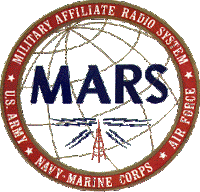Military Auxiliary Radio System
M.A.R.S. / MARS / Mars Radio
MARS is a civilian radio program consisting primarily of licensed amateur radio operators who are interested in assisting the military with communications on a local, national, and international basis as an adjunct to normal communications. The MARS programs also include active duty, reserve, and National Guard units; Navy, Marine Corps, and National Oceanic and Atmospheric Administration ships, and Coast Guard cutters and shore stations.
Military Auxiliary Radio System provides Department of Defense sponsored emergency communications on a local, national, and international basis. MARS also provides auxiliary communications for military entities only. One major mission that MARS has had for many years is to handle morale, welfare, and official record and voice communications traffic for Armed Forces and authorized U.S. Government civilian personnel stationed throughout the world.
Every year, MARS conducts an appropriate military and amateur radio cross-band exercise as an integral part of the annual Armed Forces Day. They provide a reserve of personnel trained in military radio communications, techniques, and procedures as well as to initiate efforts to improve radio-operating techniques. MARS members test state-of-the-art technology through experimentation and testing.
Morale and welfare messages are no longer the largest activity in MARS due to the increased use of the Internet and e-mail by deployed military personnel. MARS had an increased role in providing interoperability communications between Army National Guard and Air National Guard forces and civilian state agencies. However, this service providing interoperability communications was terminated as of May 2015.
MARS also supports government agencies such as the Federal Emergency Management Agency, and participates in programs such as the Department of Homeland Security Office of Emergency Communications SHAred RESources (SHARES).
Active MARS Frequencies
Although they say that MARS frequencies are not allowed to be given out by MARS operators. However, the spectrum is no place to hide a frequency as any competent DX'er can find the frequencies.
List 1
IN Khz
- 3311 USB
- 3315 USB
- 3390 USB
- 4000 - 4040 USB
- 13927 USB Phone Patch Net
List 2
USN MARS Voice 14441 kHz USN MARS FEC 4874 7383 7833 USN MARS PACKET 6775 6779 7683 7833 14352 14513 14532 USAF MARS Voice 13927 kHz
List 3
Region 2 (AL FL GA KY NC SC TN VA WV)
Net Control Station: AGA2LA (VA)
- Primary flight Frequency: 3299 Khz "Romeo Delta"
- Seconary Day/Nite Frequency: 4580 Khz "Romeo Echo"
- Primary Day Frequency: 7313.5 Khz "Romeo Foxtrot"
Misc Othe USAF MARS Frequencies :
- 4832 4872 6996 7632 14390.5 Khz
RTTY (10/75N):
- 7633.5 7832.4 14392.5Khz
List 4
10255 Navy/Marine Corps MARS Common US Navy Nationwide USB 13977 Air Force MARS US Air Force Worldwide USB 13993 Air Force MARS Transcontinental Network US Air Force Nationwide USB 13996 Army MARS US Army Nationwide USB 14385 Navy/Marine Corps MARS Common US Navy Worldwide USB 14487 Air Force MARS US Air Force Worldwide USB
List 5
If you are looking for military aircraft voice traffic you will find a considerable amount on the U.S. Air Force Military Affiliate Radio System (MARS) phone patch network frequencies. The primary frequencies used are 13927.1 and 20992.1 kHz.
Frequency/Designator Matrix (USB mode)
- 4557.1/RK
- 7633.6/ACJ
- 13927.1/ACB (Primary)
- 14606.1/ACF
- 18617.1/Unknown
- 20992.6/ACZ
MARS conducts a phone patch admin net on Sundays at 1600 UTC on 13977.1 kHz (ACC).
Why do they call it MARS CAP Mod
Amateur radio operators that expand the frequency coverage of their transceiver often do so after researching the MARS/CAP mod (modification) for their radio. But why is it called MARS CAP? Is it like a baseball cap?
- MARS is the Military Affiliate Radio Service. They use HF and VHF frequencies near ham bands to forward personal messages to/from military personnel. Very useful during major mobilization like we are seeing now.
- CAP is Civil Air Patrol. Part youth group and part domestic search and rescue auxiliary for the Air Force. They also use frequencies near ham band, and ham volunteers, to coordinate search activities and relay messages.
Often expanded transmit modification to a ham radio transmitter is done based on a MARS/CAP modification guide when the user is not a MARS operator or member of the Civil Air Patrol. This is not necessarily right, and often illegal to use such modified equipment, however, the terminology is deeply rooted in the owner's quest for the correct modification procedure.
Performing the MARS/CAP modification of a ham radio transceiver is intended for actual MARS radio operators or Civil Air Patrol radio operators.
It is not illegal to use an amateur radio transceiver or receiver with expanded receive coverage to listen to transmissions below 834MHz. Listening to radio traffic between 824-849MHz or 869-894MHz remains illegal as of 2017 due to an outdated FCC regulation regarding the AMPS phone system.
